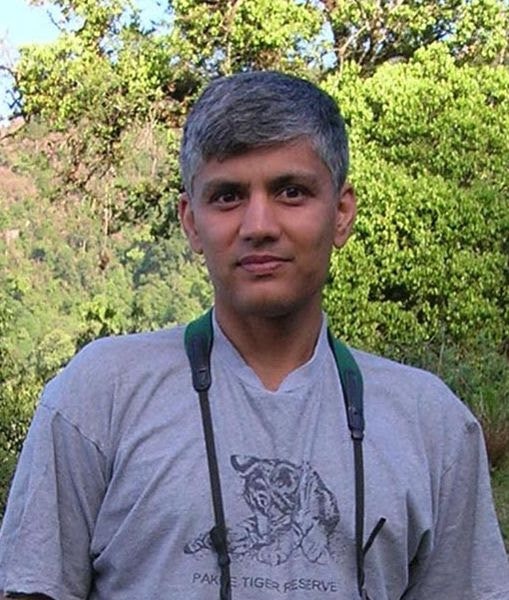Forging alliances with Himalayan communities for wildlife sanctuary management, Arunachal Pradesh, India
Ramana Athreya is the Biodiversity Research and Conservation Coordinator of EcoSystems-India. An astronomer by profession, for the past three decades, Ramana has focussed his attention increasingly away from the stars to become one of India’s most skilled naturalists.
Since 2003, Ramana has worked with the local communities of Arunachal Pradesh to strengthen conservation of one of India’s last areas of relatively unspoilt wilderness. Nestled in the shadow of the Himalayas, with 70% of its forest cover still intact, Arunachal Pradesh is the least industrialised and least populated of India’s 28 states. A globally important biodiversity hotspot, two-thirds of India’s species occur here, including tigers and elephants, along with many rare birds, insects, reptiles, and plants – an astonishing array of life.
Arunachal Pradesh is also culturally diverse. Its million or so inhabitants consist of dozens of unique groups, each with their own religious systems and languages. However, the region also has one of the country’s highest rates of population growth and is experiencing increasing development, with mega-projects such as the building of roads an escalating threat. The future of Arunachal Pradesh’s wild areas and the species they contain is uncertain.
Conservation in the region has historically been haphazard. Ramana explains, “Conservation here largely operates in a knowledge vacuum. The management of wildlife sanctuaries is based on few data and with virtually no input from the communities who impact them most.”
Ramana has worked to change this and engage local people. In 2003, his team was the first to document the area’s rare and endangered wildlife, in doing so discovering the Bugun Liocichla, the first bird new to India in 60 years. Named after the tribe who were central to Ramana’s research effort, it led to the refusal by the Indian Supreme Court to develop a highway through the ‘Eaglenest’ area.
Building on such successes, Ramana continues to fill the knowledge gaps whilst reducing the adversarial relationship seen between local communities and Forest Officials. He is establishing formal conservation organisations in five key wildlife sanctuaries across the state, where all stakeholders can interact to understand one another and join forces for mutually beneficial conservation.
Ramana is transferring responsibility back to local people, who are proud of the globally important wilderness on their doorstep. “Local people appreciate our efforts towards marrying conservation with economic benefits, and in making them an integral part of the conservation effort. Developments in ecotourism are also beginning to create considerable local employment and revenue.”
Ramana Athreya speech at the Whitley Awards 2011







